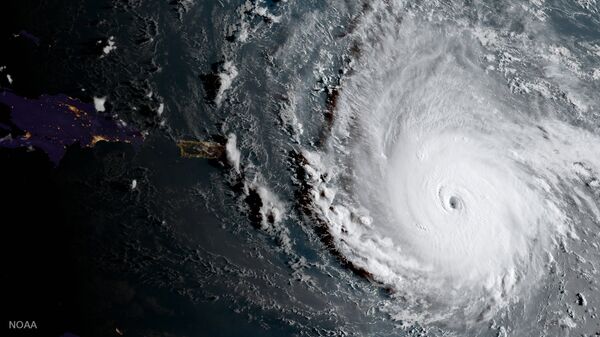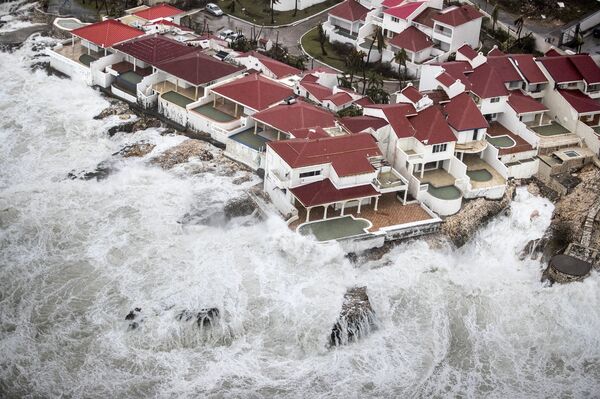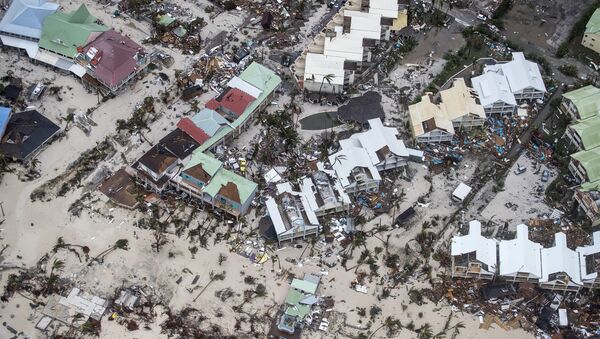Hurricane Irma has slammed into the Turks and Caicos Islands, causing massive damage to the archipelago, which lies just east of the Bahamas.
It comes as the full extent of the storm damage to another low-lying British overseas territory, Anguilla, becomes clear.
I encourage EVERYONE in the path of #HurricaneIrma to heed the advice and orders of local & state officials! https://t.co/AQmawTpZs0
— Donald J. Trump (@realDonaldTrump) 8 September 2017
Richard Allan, a professor of climate science at Reading University, said hurricanes were likely to get worse as the oceans warmed due to the climate change caused by greenhouse gases.
Professor Allan said it was not "scaremongering" to suggest that islands like Anguilla, Barbuda, as well as the Turks and Caicos Islands could even become uninhabitable one day.
"If you're on a low-lying island that's in the path of tropical cyclones, when you do get hit and the sea level is higher and you are getting bigger storm surges, more rainfall and stronger winds, then there will inevitably be much more damage and there will be a certain threshold above which society on such an island would not be viable. It's not make-believe," Professor Allan told Sputnik.
"There's not too much you can do about it, apart from adapting to these situations," he said, which might include building special hurricane-proof shelters.
"There might be a point where if your damage is so intense and too often, then it doesn't make sense to remain. But that would obviously be an extremely painful decision for any low-lying island to contemplate," Professor Allan said.
'Pathetic' and 'Disgraceful' UK Response
A former EU representative to Anguilla has criticized the British government for its "pathetic" and "disgraceful" response to Hurricane Irma.
Dorothea Hodge contrasted London's response to that of the French government, which has set up an emergency fund and has a reconstruction plan for St. Martin, which has been hit by Irma.

Ms. Hodge criticized International Development Secretary Priti Patel for her slow response to the damage to Anguilla.
"Homes have been destroyed, schools and the only hospital badly damaged, and already one death is being reported, and more is to come as there are two more hurricanes scheduled to hit Anguilla in the next few days," she said, referring to Hurricanes Jose and Katia.
"In comparison to the French president who has set up an emergency fund, an emergency hotline and a reconstruction fund her response after the storm has passed is absolutely pathetic," Ms. Hodge told the Guardian.
Legacy of the British Empire
The Royal Navy ship RFA Mounts Bay, which was in the Caribbean tackling drugs smuggling, is on hand to help out in the Turks and Caicos Islands.
The former prime minister of the Turks and Caicos, Michael Misick, posted a video of the hurricane hitting the islands on Thursday, September 7.
"Turks and Caicos is low lying coral islands and it's predicted that we may experience 15 to 30 feet waves that would completely flood all of our islands," he told Sputnik earlier this week.
Mr. Misick has been campaigning for the islands to become independent of Britain and says there is no reason why they could not be as successful as neighboring Saint Kitts and Nevis, which was granted independence in 1983.

Britain, France and the Netherlands conquered most of the Caribbean islands in the 18th century and ruled them until the 1960s and 1970s.
Jamaica gained independence in 1962 and was followed by Trinidad, Barbados and most of the smaller islands.
But Britain retains a handful of overseas territories in the Caribbean — Anguilla, Turks and Caicos Islands, British Virgin Islands, Cayman Islands and Montserrat.




